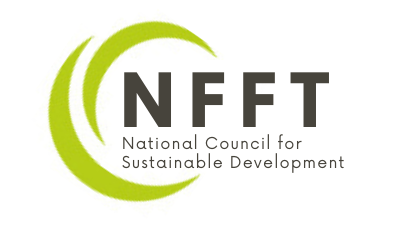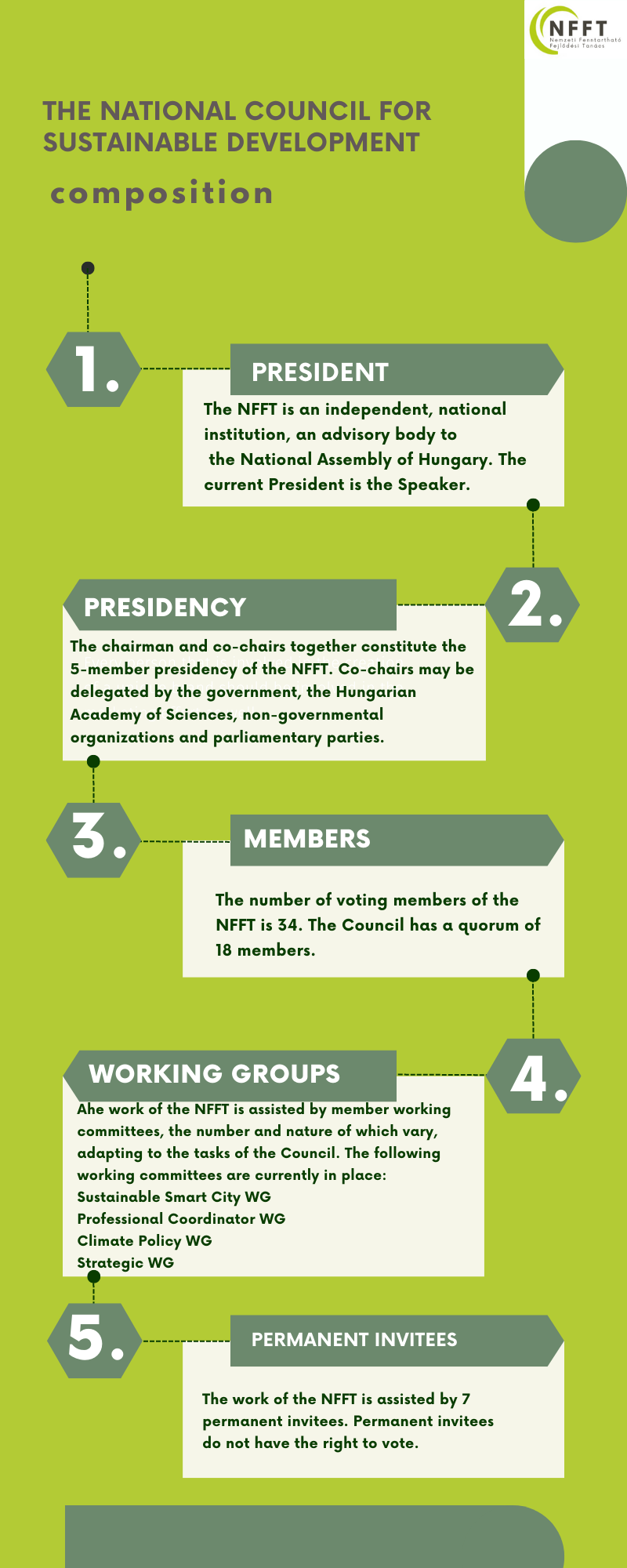National Council for Sustainable Development - NCSD
The National Council for Sustainable Development
The National Council for Sustainable Development (NFFT)
The National Council for Sustainable Development (NFFT) was established on 10 October 2008 based on a five-party consensus and initiated by the Parliament to work as an advisory and interest reconciliation body.
Composition and work schedule
The president of NFFT is the incumbent speaker of the Parliament while its members are the social groups included in the Parliament’s relevant resolution. The composition of NFFT is largely varied including representatives of political parties, the scientific community, economic interest groups, civil and religious organisations. NFFT’s work is supported by the Secretariat and the working committees including NFFT’s members and experts. The working committees perform the professional review of NFFT’s matters, provide professional opinion on certain issues and make proposals regarding areas relevant for NFFT.
Based on its yearly adopted work plan, NFFT holds four meetings every year. The work plan is drawn up by the presidency and adopted by the Council. The work plan includes all the issues the Council wishes to discuss or the discussion of which is requested by the president or the presidency. The agenda of the meetings is created based on the suggestions of the Secretariat, the Working Committees and the members of NFFT. NFFT functions in the form of regular plenary sessions, the meetings of the working committees, conferences, workshops, professional and civil meetings.
The agenda of the Council’s meetings regularly includes the discussion of widely relevant topics followed by the adoption of a statement. These statements are available on NFFT’s website.
NFFT’s role
NFFT as an independent national institution is responsible for facilitating the definition of the principles, objectives and comprehensive tasks of sustainable development in Hungary, the consideration of the related international cooperation, promoting the regular revision and implementation of the sustainable development strategy, supporting the coordination of the relevant planning and consultation activities, raising awareness and social engagement and implementation of the international Sustainable Development Goals (SDG) adopted in 2015.
One of NFFT’s priorities is to promote an attitude change in all the segments of the society. To strengthen social engagement, it encourages and supports public outreach activities on a wide scale. Apart from extensive press coverage, NFFT releases many publications and working papers to help the wider public and professional organisations be informed about sustainability. NFFT regularly reports to the Parliament on its activities.
Between 2010 and 2012, following broad professional and social consultation, the National Framework Strategy on Sustainable Development was drawn up to be adopted by the Parliament in March 2013 with a resolution. NFFT publishes a Monitoring Report every two years to inform the public and the Parliament on the implementation of the Framework Strategy.
NFFT’s network
NFFT maintains wide-ranging relations with the institutions responsible for the various important sub-fields of sustainable development including the National Environmental Protection Council, the Ombudsman for Future Generations and the Directorate for Environmental Sustainability at the Office of the President of the Republic.
NFFThas been engaged in the global but most importantly the European sustainability cooperation since 2009. Being active in a number of prominent international organisations (EEAC, ESDN), NFFT is working to encourage cooperation between the member states to promote sustainable development. NFFT’s secretary is the co-chair of EEAC’s Working Group on Sustainable Development (WGSD) and ESDN’s associated partner.
NFFT has been involved as national coordinator in the initiative called European Sustainable Development Week offering a series of events every year since its launch in 2015. This allows for the dissemination of good international practices in Hungary as well as the demonstration and promotion of Hungary’s achievements in this area to a wide international public. Through its expanding network, NFFT supports the fulfilment of our obligations regarding sustainable development set forth in our Constitution.


